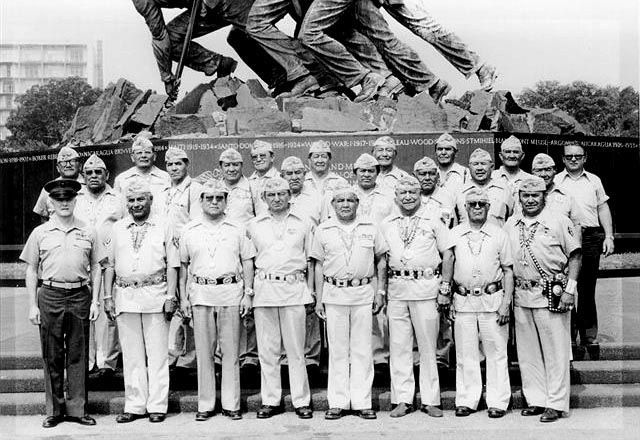During WWII, the Marine Corps developed the ... Speaking of publicity and self promotion.
Almost no one will know that code talkers was an Army thing, which they started in WWI and kept using in WWII in the Pacific, Europe, and North Africa.
Cherokee, Choctaw, Comanche, Meskwaki, and they were not all Indians, Basque radio operators were also code talkers for the US Army.
It must be weird for them to see how the Marine public relations activities created such a mythical hero status for the radio men who spoke Indian, who were in the Marines.
Use of Cherokee
“The first known use of Native Americans in the American military to transmit messages under fire was a group of Cherokee troops utilized by the American 30th Infantry Division serving alongside the British during the Second Battle of the Somme. According to the Division Signal Officer, this took place in September 1918. Their outfit was under British command at the time.”
Use of Choctaw
“In the days of World War I, company commander Captain Lawrence of the U. S. Army overheard Solomon Louis and Mitchell Bobb conversing in the Choctaw language. He found eight Choctaw men in the battalion.[3] Eventually, fourteen Choctaw men in the Army’s 36th Infantry Division trained to use their language in code. They helped the American Expeditionary Force win several key battles in the Meuse-Argonne Campaign in France, during the final big German push of the war. Within 24 hours after the Choctaw language was pressed into service, the tide of the battle had turned. In less than 72 hours the Germans were retreating and the Allies were in full attack.
These solders are now known as the Choctaw Code Talkers.”
Use of Comanche
“Adolf Hitler knew about the successful use of code talkers during World War I. He sent a team of some thirty anthropologists to learn Native American languages before the outbreak of World War II. However, it proved too difficult for them to learn the many languages and dialects that existed. Because of Nazi German anthropologists’ attempts to learn the languages, the U.S. Army did not implement a large-scale code talker program in the European Theater. Fourteen Comanche code talkers took part in the Invasion of Normandy, and continued to serve in the 4th Infantry Division during further European operations.”
Use of Meskwaki
“Meskwaki men used their language against the Germans in North Africa. Twenty-seven Meskwaki, then 16% of Iowa’s Meskwaki population, enlisted in the U.S. Army together in January 1941”
On the Code Talkers own website, is found a petition to congress for recognition of other code talkers:
"It is estimated that at least 18 tribes have contributed Code Talkers to both world wars. These include Cheyenne, Comanche, Cherokee, Choctaw, Osage, and Yankton Sioux in WWI, and in WWII, Chippewa, Choctaw, Comanche, Creek, Hopi, Kiowa, Menominee, Muscogee-Seminole, Navajo, Oneida, Pawnee, Sac and Fox (Meskwaki) and Sioux (both Lakota and Dakota dialects). There may be others - this still needs to be fully investigated."
